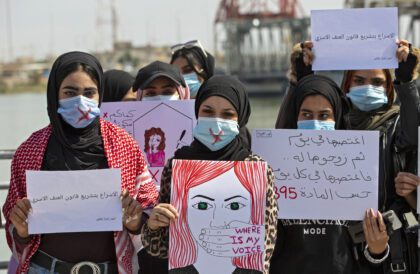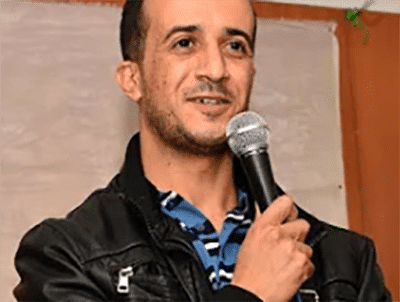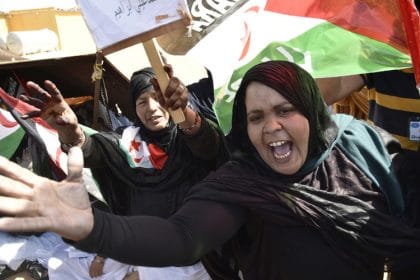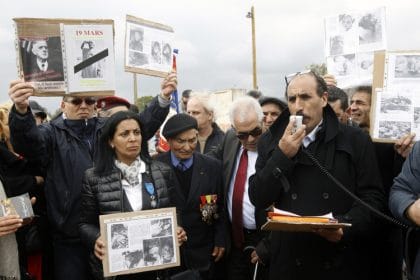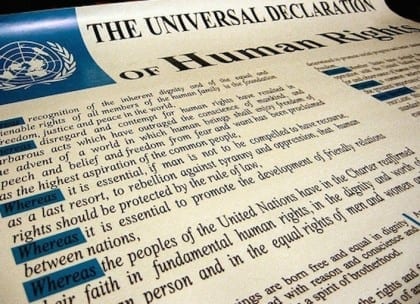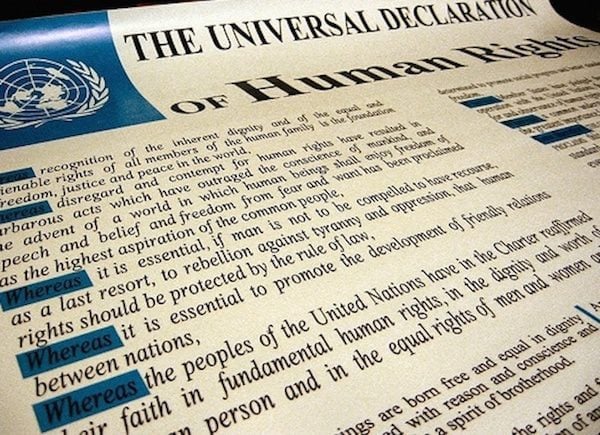
Introduction
The concept of human rights has become a well-known and widely accepted term to use. Varying interpretations are possible, with differences usually being based on cultural background. Nonetheless, most of these understandings consciously or subconsciously include the basic rights outlined in the United Nations’ Universal Declaration of Human Rights.
The United Nations General Assembly (GA) adopted the Universal Declaration of Human Rights on December 10th, 1948. It was written in the aftermath of World War II, “… as a common standard of achievement for all peoples and all nations, to the end that every individual and every organ of society, keeping this Declaration constantly in mind…” Thus it was truly meant to be universal, to protect citizens from any type of violation the world had recently experienced, as outlined in the Preamble and 30 Articles.
As such, it includes articles on the right to life in dignity; liberty and security; freedom of movement; right to nationality and education; just treatment of human beings and respect; as well as freedom of expressions and opinions, from torture or inhumane treatment, as well as economic, social and cultural rights.
International Human Rights Law
The Declaration is not legally binding, but is the basis of international human rights law. Two binding UN covenants were formed as a result of the UDHR; the International Covenant on Civil and Political Rights and the International Covenant on Economic, Social and Cultural Rights. Combined, these three documents are often referred to as the “International Bill of Human Rights”.
Over the years other conventions have been written to expand on and add to this fundament, focusing on a variety of topics such as refugees (1951 and 1967), discrimination of women (‘CEDAW’, 1979) and disabled persons (2008), against torture (1987), protection of migrant workers (1990), and against racial discrimination (1969) to name a few.
Additionally, the International Labour Organization has compiled a large number of conventions specifically related to work force and labour standards, of which 8 are considered ‘fundamental conventions’ and relate to freedom of association (1948, C087), collective bargaining (1949, C098), forced labour (1930, C029 and 1957, C105), minimum age (1973, C138), child labour (1999, C182), equal remuneration (1951, C100), equal opportunity and treatment (C111).
Geneva Conventions
The Geneva Conventions are a revision of previously constructed conventions, adjusted after WWII and specifically focus on treatment of persons in time of war. It consists of four Conventions, and three additional protocols. The International Committee of the Red Cross (ICRC) explains that the Conventions “aims at ensuring that, even in the midst of hostilities, the dignity of the human person, universally acknowledged in principle, shall be respected.”
During a series of expert meetings, congregations by Red Cross agencies, and a confluence of government representatives over time, the articles were revised until a draft was represented at The Diplomatic Conference for the Establishment of International Conventions for the Protection of Victims of War in 1949. The Final Act was signed by fifty-nine nations, some of which no longer exist, and has attained more signatories since.
The Cairo Declaration on Human Rights in Islam (CDHRI) was compiled by the Organisation of Islamic Cooperation (OIC) in 1990, during the 19th Islamic Conference of Foreign Ministers in Cairo, and has 57 signatories. This Declaration holds similar – if not identical – principles as the UDHR, but notably also included articles related to ‘jus in bello’ – acceptable wartime conduct, alike the Geneva Conventions. The CDHRI also addresses equality between women and men, rights of the child, freedom, right to medical care, right to self-determination, amongst others. Most notably is that this 25 Article document clearly lists the Sharia as reference point including for punishment. The CDHRI has been adopted by 45 countries, out of the total 57 members of the OIC.
Conventions Signed by Algeria
Algeria signed the Geneva Conventions on 20 June 1960, and the Additional Protocol I (Protection of Victims of International Armed Conflicts), AP I Article 90, and Additional Protocol II (Protection of Victims of Non-International Armed Conflicts) on 16 August 1989. Moreover, it became signatory to the Convention for the Rights of the Child (CRC) on 16 April 1993. On May 6, 2009 the Algerian government signed the Optional Protocol to the CRC.
Algeria has been member of the OIC since 1969, and ratified all 8 fundamental ILO conventions.
Refugees
The Convention relating to the Status of Refugees is based on Article 14 of the UDHR, and recognizes the right of asylum and protection of refugees. It was approved during the General Assembly meeting of December 14, 1950 and came into force on April 22, 1954. However, the original Convention limited its scope to refugees fleeing prior to 1 January 1951. As such, an additional protocol was compiled in 1967, removing these limitations.
On 21 February 1963, Algeria became ‘successor’ to the Convention and Protocol. Succession, in relation to multilateral treaties, means the State expressed its consent to be considered as bound thereby.
Women
The Convention on the Elimination of All Forms of Discrimination against Women – also called CEDAW, was approved during the General Assembly Session on 18 December, 1979 and entered into force on 3 September 1981. Algeria confirmed its accession on 22 May, 1996. Through “accession” a state accepts the offer or the opportunity to become a party to a treaty, which has already negotiated and signed by other states. It has the same legal effect as ratification. Countries that have ratified or acceded CEDAW are legally bound to put its provisions into practice, and thereby agree to submit national reports on measures taken to comply with its obligations. Such reports are to be compiled at least every four years.
It did voice reservations, namely against Article 2, condemning discrimination against women – stipulating the condition it does not conflict with the Algerian Family Code; Article 9 (2), concerning children’s nationality – stating its incompatibility with Algerian Nationality and Family Code; Article 15 (4), equality of freedom of movement – stipulating interpretation of the article relating to right of women to choose their residence and domicile cannot contradict Chapter 4 of Algerian Family Code. Similarly, Article 16, eliminating discrimination in marriage and family matters and child marriage, was accepted provided non-contradiction with the Family Code, and Algeria states it does not consider itself bound by Article 29 (1), discussing dispute between states concerning interpretation or application of the Convention. It is noteworthy that Article 29 (2) specifically allows for such a reservation.
Persons with Disabilities
The Convention on the Rights of Persons with Disabilities was approved during the General Assembly session on December 13, 2006 and came into force on May 3, 2008. Simultaneously, the Optional Protocol was approved, giving the Committee on the Rights of Persons with Disabilities (CRPD) competence to examine individual complaints with regard to alleged violations by States parties to the Protocol. The CRPD is the body of independent experts that monitors implementation of the Convention.
Algeria signed the Convention on March 30, 2007 alongside the Optional Protocol, and ratified the former on December 4, 2009 without any reservations.
Torture
The Convention against Torture and Other Cruel, Inhuman, or Degrading Treatment or Punishment, also referred to as just the Convention against Torture, was adopted during the General Assembly session on December 10, 1984. On June 26, 1987 it was registered and thereby came into force. Its implementation is monitored by the Committee Against Torture (CAT), composed of ten individuals of various nationalities. All signatory states are obliged to send regular reports to the CAT, based on which recommendations are made.
Algeria signed the Convention on November 26, 1985 and ratified it on September 12, 1989. Two declarations were made upon its ratification, relating to the competence of the Committee as described in Articles 21 and 22.
Migrant Workers
The International Convention on the Protection of the Rights of All Migrant Workers and Members of their Families was approved by the General Assembly on December 18, 1990 and entered into force on July 1, 2003. Algeria acceded to it on April 21, 2005, with reservation to Article 92-1 referring to disputes arising pertaining to interpretation or application of the Convention. Algeria noted it does not consider itself bound by this paragraph, as allowed for by Article 92-2.
Racial Discrimination
The Convention on the Elimination of All Forms of Racial Discrimination was approved by the General Assembly and accordingly opened for signature on March 7, 1966. It entered into force on January 4, 1969. Despite the obvious as stated in the Convention title, it aims to obliterate hate speech and promote understanding. Implementation of the articles is monitored by the Committee on the Elimination of Racial Discrimination, to which bi-annual reports are submitted by each signatory. It also is responsible for handling inter-state and individual complaints related to non-conformity to the provisions of the Convention, as prescribed in Article 14.
Algeria signed the Convention on December 9, 1966 and ratified it on February 14, 1972. On September 12, 1989 Algeria submitted a declaration in which it recognized the competence of the Committee.
Human Rights in Algeria
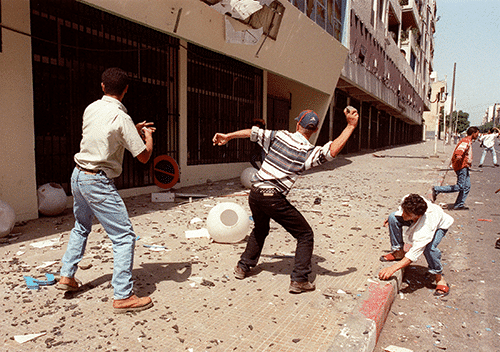
The civil war of the 1990s brought large-scale violations of human rights. The number of victims is estimated, by government officials and others, at about 200,000. Civilians were explicitly targeted, for their opinions or on the grounds of siding with the enemy. Torture was widely practiced in prisons and other detention centres. Victims included both well known and ordinary Algerians. Summary detentions and ‘disappearances’ were widespread. State security personnel and armed Islamist groups bear the main responsibility, although militias under indirect state control and criminal gangs appear often to have been the perpetrators.
Impunity for these crimes remained a major issue after most hostilities ended. In part, this is due to the policy of peace and reconciliation, under which the perpetrators of many crimes by the army and other security branches, the militias, and some Islamist groups have been pardoned. Although these pardons were initially restricted to those who had not been accused of murder or other grave crimes, the amnesty was later broadened to include entire groups of former Islamist fighters, even though their possible involvement in such crimes had not been investigated.
This reflects a social climate in which many prefer not to revive the dark decade, as it may shatter the peace. Human-rights activists and, in particular, the families of the ‘disappeared’, have remained active in their attempts to break the silence and bring the perpetrators to justice.
International organizations such as Amnesty International and Human Rights Watch have, from the beginning, called for the international investigation of human-rights violations during the civil war. For a long time, especially at the height of the village massacres at the end of the 1990s, the government and its supporters opposed such action. More recently, international human-rights organizations have been given access to Algeria. In some exemplary cases, Algerians suspected of human-right violations faced charges abroad. In 2011 General Khaled Nezzar, the instigator of the 1992 coup, was held for questioning in Switzerland.
In July 2012 the Swiss Federal Criminal Court rejected his appeal that his position as Minister of Defence, at that time, offered him immunity and protection from criminal prosecution in Switzerland.
Latest Articles
Below are the latest articles by acclaimed journalists and academics concerning the topic ‘Human Rights’ and ‘Algeria’. These articles are posted in this country file or elsewhere on our website:




